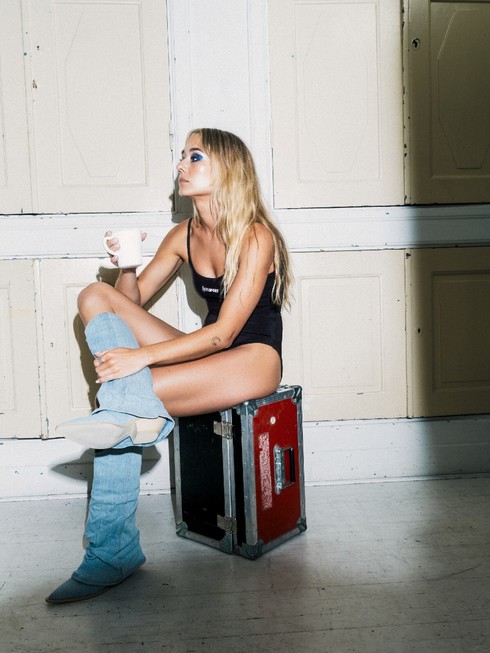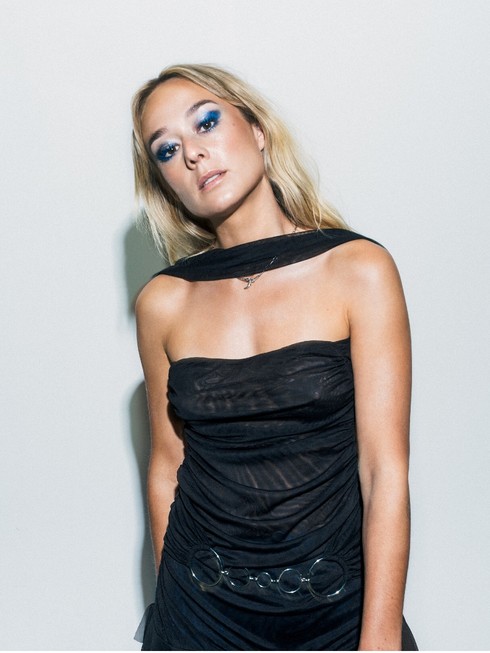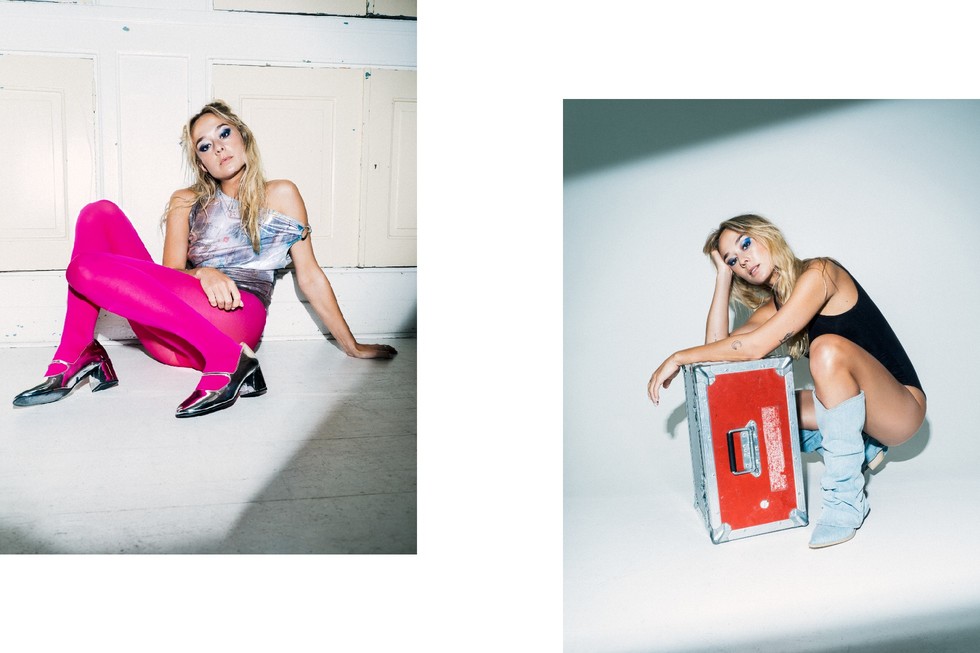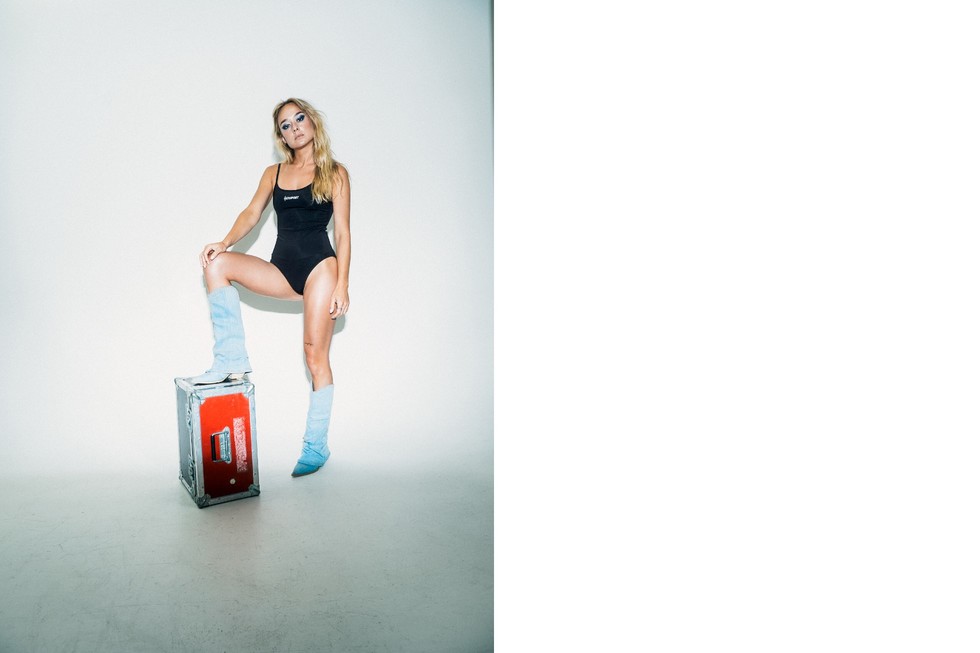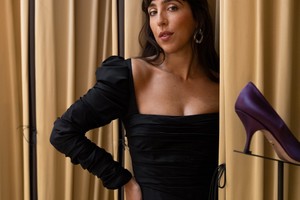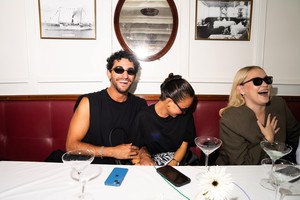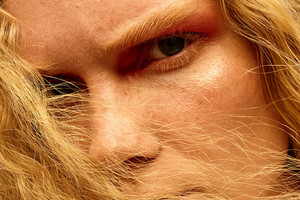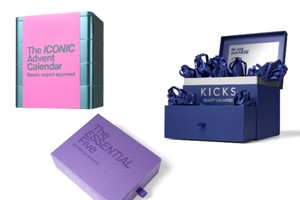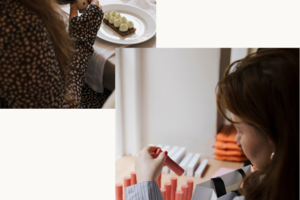Alba August: “I decided I was going to be the last man standing”
Written by Natalia MunteanAlba August has had a busy few months. Two years after her debut album “I Still Hide,” the artist returned in October with a new EP titled “I Wish I Was Someone Else,” earning her the title “Swedish rock queen” from a music critic. “It was surprising because I didn’t see the EP as rock, but I relate to this idea in a way. I wanted it to be less polished, more raw, and I enjoyed being a badass in the music videos,” says August.
Besides the developments in her music career, the Danish-Swedish artist graces both big and small screens, starring in “Stockholm Bloodbath,” a new movie by Mikael Håfström, and the Danish series “Bullshit.”
Born into a family of cinematic royalty, August has been forging her path with a sense of self-assurance, introspection and a pinch of mischievousness. In this conversation, Alba reflects on her artistic evolution, navigating the complexities of creativity, self-discovery, and balancing her music and acting careers.
Natalia Muntean: This is your second EP after your debut album. How do you see the musical journey that you’ve been on between these two releases?
Alba August: With “I still hide“ I wanted more energy. During production, I was constantly pushing for more—choirs, layers, you name it. But this time around, I remember talking to my producer and saying, “Take away, take away, take away.” I wanted this to be different. The first album was me wanting to be excessive. Now, I craved something stripped down, more raw. These albums are like a showcase of where I am in my personal journey. Back then, I was in a different place, I had a more extroverted lifestyle, with a lot of partying. But now I’ve come to realize how sensitive I am to sounds and people. I’ve always been that way, but I’ve only just realised the source of all the anxiety. I needed to pare things down in my music. I needed to be more direct. It’s, for sure, a way of processing what’s going on in my life and my mind. Even with what I’m working on now, it will have even fewer elements. I always want to do things that I haven’t heard before. And I want to push myself in directions where I’m a bit uncomfortable.
NM: What I understood about “I Wish I Was Someone Else”, the whole EP, is that it has hints of empowerment, self-discovery and living with one’s decisions. You’ve also turned 30 this year, so I wonder if that impacted the stories you tell or the music you put out in the world.
AA: This EP focuses on some things I was struggling with. Trying to understand more about myself is something that I have always liked since I can remember, maybe since I was five years old. I’ve always been super anxious and felt very lonely but I didn’t realise that the feeling I felt was loneliness. Now, as a grown-up, I understand it. And then I realised that I always felt weird. All of these things started to resurface as I was writing this. So “I wish I was someone else” was absolutely a way to allow myself to be the weirdo I am. But it’s also about wishing I was normal. That’s what’s so amazing about being an artist and working with art - only when I am being creative I can fully be myself. It’s the only time when I’m really happy and Zen with being in this world.
NM: You mentioned that you have social anxiety, however, you are an artist in the public eye and you expose yourself to the world. How does it work then?
AA: In a way, being an artist it’s a bit like a persona. I think in private it’s harder to cope with being me compared to when I’m performing.
NM: So is there a split between Alba in your personal life, so to speak, and Alba, the artist?
AA: There’s a word in Swedish, hudlös, which means skinless and that’s how I feel in private, like I have no skin, more vulnerable, as if everyone can see inside of my body and I have no protection. But when I’m in character, when I’m acting or on stage, I feel strong and I feel like I have control over the situation.
NM: Do you feel that on stage you have more freedom to do whatever you would like to do without being judged?
AA: Yes, on stage I feel I have power over the audience. It’s clearer what my role is when I’m performing. Everything is decided: I’m going to be on stage and I’m going to do this and they are going to sit and watch. And in my private life, everything is uncertain, and I have a hard time coping with that.
NM: In the video for “The Summer of 99” there’s a lot of footage from your childhood. How does it feel to revisit those memories, and how does it impact your music? Does reconnecting with your younger self shape the stories you want to tell?
AA: I have mixed feelings about looking back. In a way, it’s a bit sad watching those videos when I was feeling so free, so unaware of how people perceive me. But I also just love the early 2000s. There’s something about that time. Life was so much about dreaming about what it was going to be when I got older. Looking back I also realised how creative life was. My sister and I were always rehearsing a dance or a play. There was always a project we were working on. And there was so much lightness, silliness and humour in the things we did. And it’s hard to find time and space for that as an adult because adult life is so much about achieving, making money and doing boring things. I feel like there’s not that much energy and time left for fantasy and doing meaningless stuff that could perhaps be meaningful, for your well-being and the world's health.
NM: You mentioned you were dreaming of all the ways life could be. Did life turn out the way you were dreaming of when you were seven?
AA: In a way, yes. I mean, I dreamt of having a boyfriend, which I then ended up having a couple, but it never felt like I thought it would. It turned out to be much more complicated. Life isn’t what I imagined when I was seven. Inside, I feel the same as I did at that age, but as an adult, I got better at swapping different roles for different situations. I thought I would be content when I got older, and that hasn’t happened yet. I’m still searching but I realised that it’s something you have to find within yourself, unfortunately, you can’t change the surroundings.
NM: It’s been a few years since you’ve combined acting with singing. What are you now, an actress or a singer?
AA: I consider myself an artist (not a singer-artist). It’s empowering because, as an actress, you’re dependent on others to choose you for roles. It’s challenging to take charge and make a movie yourself. I hope that will change, that you will be able to create roles together with a director or you will be able to work with producers or directors on your own projects. As a music artist, I have more freedom to choose what I want to do. I get to decide when I want to go on tour, how I want it to be, and which story I want to tell. I get to be the creator. As an actress, there’s a lot of non-acting work, like travelling and hours spent in makeup. When acting is like 5% of what you do and the rest is stuff that has nothing to do with acting, it can sometimes feel a bit meaningless.
NM: How do you prioritise between acting and music? Do you see yourself doing more of or dedicating more time to just one of these two avenues?
AA: I like combining those two, but acting has always been my calling. It’s always been what I’m supposed to do in life. Music is more of a hobby. The most important thing is that I get to be creative, and when one of the things starts to feel more like a job, then I need the other one. Always trying to find that balance. I need to do acting to get money because where I am right now with my music career, I need my acting career to survive. l love acting but I’ve been doing it for so long that it takes less time for me now to get frustrated about projects I don’t like. And it’s also hard being a woman in the film industry. You just have to work harder.
NM: You come from a family of established figures in the film industry. I wonder how that influenced you? And if you felt the pressure of meeting expectations?
AA: In a way, I felt that I was never going to be good enough. I mean, my dad has every prize in the world that you can win. And the same goes for my mom. I also grew up under the impression that an actress was always someone playing the main character, Growing up looking up to my mum and dad made me work harder, to be as good as them. In that sense, I’m grateful for that pressure.
On the other hand, growing up in that family also gave me self-confidence. I have a strong feeling that I know what’s good and what’s not. I think it gave me a sense of security. I’ve never felt insecure on a film set or around any big stars. As an actress, I think it's great to be able to direct yourself and follow your gut. But then, of course, you have to be open and collaborate on those things. But also have a strong feeling or belief in what you think is good. I’ve always had that. And I think that comes from my background.
NM: You mentioned also that you’ve barely ever worked with women in the film industry. Having your mom as a director, did you feel that that was more of an incentive to also be part of this world? Or did she ever advise you against becoming an actress?
AA: I mean, I think I’ve seen both sides of it. I’ve seen how much my mom loves her job and how highly she prioritises it. And her friends as well. So I’m inspired by her. I also struggled at school, and I never felt I would be able to do anything else. Acting seemed the only way for me to succeed in life, so I’ve always known I wanted to be an actress.
NM: You’ve played such diverse roles. How do you choose them?
AA: I think I’ve been lucky because not every female actress gets to have those kinds of roles. And to be honest, it’s not that often that you, as an actor, choose between roles. It’s more about being realistic, as it takes so much time to shoot. When I choose roles I think mostly about who I get to work with, what kind of character it is, what would the process be like, would I be able to colour this myself. And I’ve had a few of those where it was about bringing home the bacon. And then there are some where you own the project and those count for a whole life.
NM: What attracted you to the role of Freja in Stockholm Bloodbath?
AA: I worked with Mikael Håfström, the director, before, and loved it. He gives a lot of freedom. He picks people who inspire him. And then the actors get to do their thing and try different things. Which I love. And then Stockholm’s bloodbath is one of the biggest historical moments in Sweden and I knew that it was going to be a big movie because there was also a good budget. Doing an action movie like this was something that I wanted to do and it was fun. When I think of myself being on set, it is just dark and muddy because I started my days at four in the morning during winter and then had to do stunts. But other than that, it was a dream team with all the actors and the crew.
NM: Did you do your stunts in the movie?
AA: Most of them. We had a week of stunt training with horse riding in the morning and afternoons rehearsing different choreographies with stunts. So I did the fighting scenes myself. My character is mute, so I had to learn some sign language. She stopped talking as a child, and she’s sensitive and a bit weird.
NM: It sounds like a challenging character to play.
AA: It was. I like to edit my lines, take part in writing the scenes a bit and be very involved. And this time it was hard because I had almost no lines. There’s so much character in speaking so when you don’t have the words, it’s hard to create or find the character. I enjoyed not talking because it suits me. I’m not a very talkative person.
NM: Did you learn anything new about yourself? Or does it happen to you when you play certain characters?
AA: I guess I use parts of myself to create the character every time. When it came to Freja and her not talking, I used my own experience a bit because when I was around three years old, I drowned and after that incident, I didn’t talk for like three days. I remember feeling so ashamed of the whole situation, and my mom told me that I was very angry afterwards, so I believe it traumatised me. So, I had to understand why this character didn’t talk at the beginning. And then I thought that she must have experienced something traumatic if she didn’t talk, so then we added trauma to her childhood.
NM: Are there any other genres or roles that you’d like to explore in the future?
AA: I’m longing for really good drama. I feel like back in the day in Sweden and Denmark we were so good at that. But I can’t remember when I last saw a good realistic drama in Sweden or Denmark.
NM: Would you be open to switching to the other side of the camera and directing?
AA: For sure. When I work as an actress, I can get frustrated that I don’t get to direct because I always want to change things. So I think that I would love to try it. At the moment, there’s no time. And I think that directing a movie would take at least a year to prepare for it, to search for money to develop the project, and I don’t have that patience in me at the moment. But maybe in 10 years.
NM: How do you find time for yourself? And how do you recharge your batteries?
AA: I’m trying to find routines so there’s a clear separation between when I’m off work and when I’m working. But recharging for me is doing things with my hands: making food, organising my things, and painting. My boyfriend has a house in the countryside and just being there and cooking is just the best.
NM: You said recently that you’re in a relationship and in love, and I’m curious how this influenced your artistic journey.
AA: I don’t think it has. I think my demons are still there. It’s still quite chaotic and dramatic. So my boring answer is that it didn’t affect my creativity. But my boyfriend is the best producer we have in Sweden. So, of course, that inspires me and it’s nice being able to talk to him because I never liked talking about work with people that I’m close to. I liked to separate things. But with him it’s different.
NM: How do you handle moments of self-doubt or creative blocks when working?
AA: Being a woman comes with a lot of doubts. I just decided to keep doing it no matter what, also because doubting and then retracting would be so much more embarrassing. I just decided that I was going to be the last man standing. Also, I have so many girlfriends who have so many doubts and are held back by them. And seeing that, I was just like, that’s never going to happen. Of course, it’s difficult to feel like I’m worth the attention, and it’s hard to understand why I should get all that space. And sometimes, I ask myself what I want from my music. Do I want to change the world? What’s the point? But then again, I look at all the male rockstars, and I act like them.
NM: Very good strategy! What do you hope your audiences take away from your music?
AA: Um, I hope they feel more free within themselves, and I want people to be more open-minded and more who they are, not driven by what’s expected of them. I feel as if the whole society is just like robots walking around. So I want to move people and create a more forgiving and inspiring vibe in the world.
NM: Looking back, what advice would you give your younger self?
AA: I would tell myself there is nothing to be ashamed of. I was embarrassed by myself growing up, so I would say to be more accepting of myself.
NM: What do you hope for yourself, the musician and actress, in the near future?
AA: First of all, I want to work with women, and I want to work with my friends, with people I could relate to. I want to have more fun and please people less when it comes to my career. Be more brave in what I’m doing, and I would love to play outside of Sweden. I just like dreaming high.
NM: And for yourself, Alba the person, what do you hope for?
AA: I hope I will be more present. Usually, when I succeed at something, I never land in that moment or feeling of “Okay, I did this”. I would like not to rush to the next thing and stress about things I can’t do. I would like to be here and now, taking one thing at a time.

